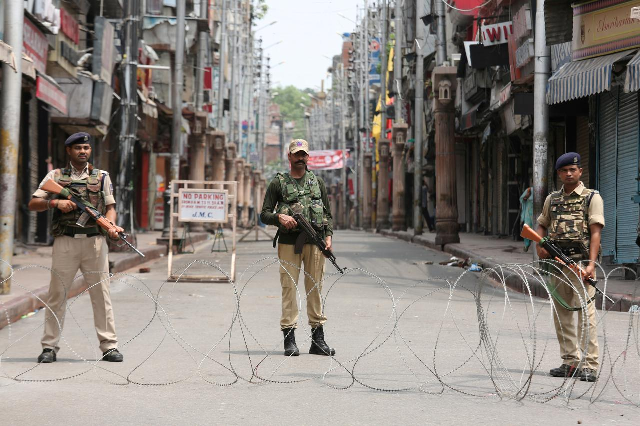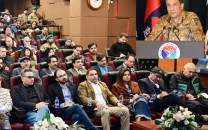Is Kashmir becoming a forgotten case?
There is no way India will reverse its policy unless Pakistan takes a firm stand on Kashmiri struggle for emancipation

Indian-occupied Kashmir. PHOTO: Reuters/File
Foreign Minister Shah Mahmood Qureshi, who should have launched an aggressive campaign against the brutal Indian acts in Kashmir, took a tour of Iran, Saudi Arabia and the US to de-escalate tensions following the assassination of Iranian Major General Qasem Soleimani in a US drone attack at Baghdad Airport on January 3. In other circumstances, Pakistan’s role to help mend fences between Tehran and Riyadh, and Tehran and Washington would have made sense. But at a time when Indian belligerency against AJK and unprecedented use of force against IOK’s Muslim population have reached their peak, Islamabad should have focused on an issue which is a matter of life and death for the people of Jammu and Kashmir (J&K) and also Pakistan.
One can also raise questions about Pakistan’s capability to mediate between Iran and Saudi Arabia, and Iran and the US. Mediation per se cannot take place unless the parties engaged in a conflict request the concerned state to do the needful. No such request has been received by Pakistan from Tehran, Riyadh or Washington. It is Oman which has a good track record of mediation between Iran and the US in 2013, which culminated in the 2015 Iran-US nuclear deal. Oman has also mediated between Iran and Saudi Arabia.
When Iran became a victim of American attacks, Pakistan should have launched condemnation instead of offers to mediate. The Saudi-Iranian discords are such that Pakistan’s efforts to mend fences between the two Muslim countries may not yield success.
The issue of J&K has lost its momentum in Pakistan’s foreign policy and has almost become a forgotten case because of three reasons. First, the policy gap in theory and practice — meaning how the Pakistani government, despite its claims of pursuing a proactive approach in internationalising the Kashmir issue, has failed to call a result oriented meeting of the UNSC to discuss the situation in IOK. According to the UN Charter, all members have the right to request a meeting of the Security Council and an emergency meeting of the General Assembly if the issue is a grave threat to international peace and security. The closed-door Security Council meeting on Kashmir held on January 15 was called by China and Pakistan which also failed to exert any pressure on India to end its brutalities. Just yesterday, there had been another discussion on Kashmir at the Security Council.
Sadly, the Organization of Islamic Cooperation (OIC) continues to pursue a non-serious approach on the Kashmir issue by calling a meeting in April this year instead of holding an emergency session. The IOK situation requires immediate action on the part of the OIC instead of discussions in April which reflects how non-committed the Saudi-led Islamic organisation is to the issue. Had Pakistan participated in the Kuala Lumpur Summit, the Kashmir issue would have been on the top of the agenda because Iran, Malaysia and Turkey have rendered their support for the Kashmiri cause. But Pakistan let them down despite agreeing to participate in that summit and withdrew under Saudi pressure at the eleventh hour.
Second, initially Pakistan’s elites were vocal in their support for Kashmiri defiance against the Modi regime following India’s J&K Reorganization Act. But when the time came to practically help the besieged people of IOK, the elites took a back-foot position because for them any activity targeting the Indian military across the Line of Control (LoC) would have been counter-productive and led to retaliation from the other side. When Kashmiri nationalists in September announced crossing the LoC to help their counterparts in IOK, Prime Minister Imran Khan stopped them, arguing that such an act would provoke India. He assured mobilising international support at the UN but nothing happened. About five and a half months have passed since the brutal Indian actions but Pakistan has been unable to muster cogent international support in this regard.
This means that the elites of Pakistan were not interested in taking the risk of practically rendering military and logistical support to the Kashmiris. As a result, the Kashmir issue has been relegated to the back burner. Knowing that the Kashmiri Muslims, after the abrogation of the special status of J&K, faced the threat of ethnic cleansing and genocide, Pakistan looked the other way and merely passed statements.
The Arab neighbours of Gaza and West Bank are blamed for being indifferent to the Palestinian struggle. As a result, Israel took advantage of Arab states letting down the Palestinian movement for independence and inundated the West Bank with Jewish settlements. Saudi Arabia, which has borders with Israel and is termed the richest Arab state, considers Iran and not Israel as a threat to its security. At some stage Pakistan may also be blamed for letting down the Kashmiri struggle and giving India a chance to absorb IOK into the union.
There is no way India will reverse its J&K policy unless Pakistan takes a firm stand on the Kashmiri struggle for emancipation. The reality is that the elites of Pakistan do not want to sacrifice their comfort zones and render practical support to the people of IOK. Those who are influential and resourceful know that any attempt to provide Kashmiris with military and logistical support across the LoC would lead to Indian retaliation and they are not prepared to take that risk. Without taking any risks Pakistan should not expect India to end its military occupation of IOK, and without pursuing a courageous stance the Muslims of IOK cannot be liberated.
Third, Kashmir has been a forgotten case because neither the economy nor politics of Pakistan is in a position to take on India by engaging its million-strong military and paramilitary forces in IOK. Why then is Pakistan not communicating to India in clearer terms that if genocide takes place in Kashmir, it will be forced to provide nuclear cover to those facing the threat of ethnic cleansing? Why has the Indian Army Chief become so courageous that he is openly threatening Pakistan to invade Azad Kashmir?
It all goes back to Pakistan’s need to strengthen its economy, ensuring governance and the rule of law, and bringing political stability. Furthermore, Pakistan must stand ready to face any Indian adventurism in Azad Kashmir. Preparing for a long struggle to emancipate the people of IOK from the Indian occupation would require a leadership capable enough of taking the risk of practically rendering support to the Kashmiris. Otherwise the future will not be any different from the present and the past.
Published in The Express Tribune, January 17th, 2020.
Like Opinion & Editorial on Facebook, follow @ETOpEd on Twitter to receive all updates on all our daily pieces.


















COMMENTS
Comments are moderated and generally will be posted if they are on-topic and not abusive.
For more information, please see our Comments FAQ